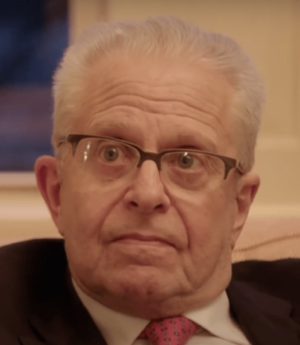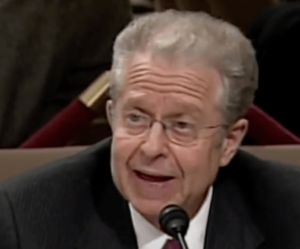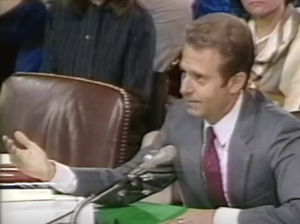Laurence Tribe facts for kids
Quick facts for kids
Laurence Tribe
|
|
|---|---|

Tribe in 2019
|
|
| Born |
Laurence Henry Tribe
October 10, 1941 |
| Education | Harvard University (BA, JD) |
| Awards | American Philosophical Society’s Henry M. Phillips Prize in Jurisprudence (2013) |
| Scientific career | |
| Notable students | Barack Obama Ted Cruz John Roberts Elena Kagan Merrick Garland Kathleen Sullivan Jamie Raskin Adam Schiff Kenneth Chesebro |
| Influences |
|
Laurence Henry Tribe (born October 10, 1941) is a famous American expert on the U.S. Constitution. For over 50 years, he was a professor at Harvard Law School, one of the top law schools in the country. He retired in 2020 but still holds an honorary title.
Tribe is known for his deep understanding of the Constitution. He helped start the American Constitution Society, a group of lawyers and students who study and discuss the law. He also wrote a very important book called American Constitutional Law. During his career, he has argued 36 cases in front of the Supreme Court, the highest court in the U.S.
Contents
Early Life and Schooling
Laurence Tribe was born in 1941 in Shanghai, China. His family is Jewish. His father was from Poland, and his mother was born in Harbin, China, to parents from Eastern Europe. At the time, Shanghai was occupied by the Empire of Japan.
When Tribe was six years old, his family moved to the United States and settled in San Francisco. He was a very bright student and graduated from high school when he was only 16.
After high school, Tribe went to Harvard University. He studied mathematics and was a star on the debate team. He graduated in 1962 with the highest honors. He then decided to go to Harvard Law School, where he also graduated with high honors in 1966.
Tribe has two children, Mark and Kerry, who are both successful artists.
A Career in Law
After finishing law school, Tribe worked as a clerk for two important judges. First, he worked for Justice Mathew Tobriner of the Supreme Court of California. Then, he clerked for Justice Potter Stewart of the U.S. Supreme Court. This experience gave him a close look at how the country's top courts work.
Teaching at Harvard
In 1968, Tribe became a professor at Harvard Law School. He became a full professor in 1972 and taught for more than 50 years. He was a very popular and respected teacher.
Many of his students went on to have amazing careers. Some of his most famous students include:
- Barack Obama, who became the 44th President of the United States.
- John Roberts, who is now the Chief Justice of the Supreme Court.
- Elena Kagan, who is an Associate Justice on the Supreme Court.
- Merrick Garland, who became the U.S. Attorney General.
- Ted Cruz, who became a U.S. Senator.
In 1978, Tribe published his book American Constitutional Law. It quickly became a classic text for law students and lawyers who wanted to understand the Constitution.
Arguing Before the Supreme Court
Arguing a case before the Supreme Court is a huge honor for any lawyer. Tribe has done it 36 times. Here are a few of his important cases:
- Restaurant Rights: In 1982, he represented a restaurant called Grendel's Den. A state law allowed churches to block nearby businesses from selling alcohol. Tribe argued this law mixed government and religion too much. The Supreme Court agreed and struck down the law.
- Civil Rights for Teachers: In 1985, he represented a group fighting a law in Oklahoma. The law would have allowed schools to fire teachers for their personal beliefs or for speaking out in favor of civil rights. The Supreme Court's decision let a lower court ruling stand, which protected the teachers' right to free speech.
- The 2000 Presidential Election: Tribe was part of the legal team for Al Gore during the very close presidential election in 2000. The election came down to just a few hundred votes in Florida. Tribe successfully argued in a federal court to allow the recounting of votes to continue. The case, known as Bush v. Gore, eventually went to the Supreme Court, which stopped the recounts.
Working with Companies
Tribe has also represented large companies in legal cases. He represented General Electric in a case about environmental cleanup costs. He also worked for a coal company, Peabody Energy, arguing against new environmental rules. Some people have criticized him for working with large corporations.
Political Life and Activism

Tribe helped create the American Constitution Society. It is a group for lawyers, judges, and law students who believe in a progressive, or forward-thinking, view of the Constitution. It was created to offer a different viewpoint from the more conservative Federalist Society.
He also served as an adviser to Barack Obama's presidential campaign in 2008. In 2010, he worked for a short time in the Department of Justice.
Views on Recent Politics
Tribe has been an outspoken critic of former President Donald Trump. In 2017, he called for Congress to investigate the president for obstruction of justice, which means trying to interfere with a legal investigation. He argued that this was a "high crime" that could lead to impeachment.
In 2023, Tribe and other legal experts argued that under the 14th Amendment of the Constitution, Donald Trump should not be allowed to run for president again. They said this was because of his role in the events at the U.S. Capitol on January 6, 2021.
In 2025, Tribe stated that the power Elon Musk and his new Department of Government Efficiency were trying to use over the government was illegal.
Controversies
In 2004, Tribe admitted that he had used some sentences from another author's book in one of his own books from 1985 without giving proper credit. This is called plagiarism. Harvard investigated and said it was a "significant lapse," but that Tribe had not meant to plagiarize.
Tribe has also been criticized for sharing unproven ideas and theories on social media, especially about Donald Trump.
Selected Books
Tribe has written many books about the law and the Constitution. Here are a few of them:
- American Constitutional Law (1978)
- God Save This Honorable Court (1985)
- Constitutional Choices (1985)
- ...: The Clash of Absolutes (1990)
- The Invisible Constitution (2008)
- To End a Presidency: The Power of Impeachment (2018)
See also
- Bill Clinton Supreme Court candidates
- List of law clerks of the Supreme Court of the United States (Seat 8)
 | Lonnie Johnson |
 | Granville Woods |
 | Lewis Howard Latimer |
 | James West |


